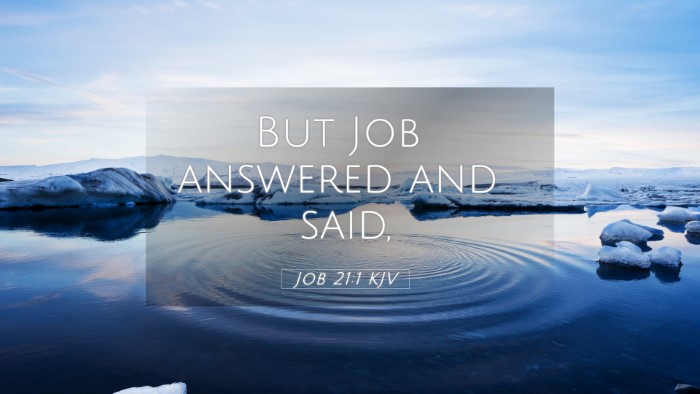Understanding Job 21:1
Bible Verse: Job 21:1 - "Then Job answered and said,"
In this verse, we witness Job's response amidst his ongoing dialogue with his friends. This response reveals Job’s deep frustration and confusion regarding his suffering, and offers insights into his understanding of justice, the human condition, and divine sovereignty.
Contextual Overview
Job's reply in verse 1 marks a significant moment in his discourse, aligning closely with themes of righteousness and inequity. The surrounding chapters illustrate Job's struggle to reconcile his intense suffering with the belief in a just God. His friends argue that suffering is always a consequence of sin, while Job questions this simplistic interpretation of divine justice.
Commentary Insights
-
Matthew Henry’s Commentary:
Matthew Henry emphasizes that Job’s answer reflects his persistence in defending his integrity. Henry notes that Job challenges the prevailing notion that misery always correlates with wrongdoing, highlighting the complexities of divine justice.
-
Albert Barnes' Notes:
Barnes points out that Job's response underscores a vital assertion; suffering does not inherently indicate personal sinfulness. He suggests that Job's assertions invite deeper introspection on the nature of suffering and the ways it may serve as a test of faith.
-
Adam Clarke's Commentary:
Adam Clarke provides a linguistic analysis, remarking on the importance of Job taking the stance of a respondent rather than a victim. His proclamation invites discussion on the legitimacy of questioning one's suffering and seeking clarity from God.
Thematic Connections
This verse resonates with several overarching themes found throughout the Bible, particularly around justice, suffering, and faith. Job's question invites readers to explore:
- The Nature of Suffering: How does the Bible depict the righteous suffering despite their integrity?
- Justice of God: What implications does Job's lament have for our understanding of God's justice in the world?
- The Human Condition: How does Job's struggle reflect broader human experiences of doubt and frustration?
Bible Cross-References
Job 21:1 connects with various scriptural themes and verses that enrich our understanding of suffering and divine justice. Notable cross-references include:
- Psalm 73:3-5: The Psalmist reflects on the apparent prosperity of the wicked.
- Ecclesiastes 7:15: Wisdom literature exploring the paradox of the righteous suffering.
- Jeremiah 12:1: A prophet struggles with the seeming injustice of God toward the wicked.
- Romans 8:28: The New Testament insight into God working all things for good for those who love Him.
- 2 Timothy 3:12: A reminder that all who desire to live godly lives will face persecution.
- 1 Peter 4:12-13: Encouragement for believers confronting suffering.
- Hebrews 12:6: Insight into the Lord's discipline as a sign of His love.
Conclusion
Job 21:1 serves as a crucial part of the dialogue on suffering, pushing readers to engage with the complexities of pain, justice, and faith. Through careful analysis of this verse and its connections, one uncovers a rich tapestry of insights that resonate throughout scripture.
Understanding its meaning not only enhances our knowledge of Job's story but also strengthens our grasp of foundational biblical themes that transcend individual life experiences.


